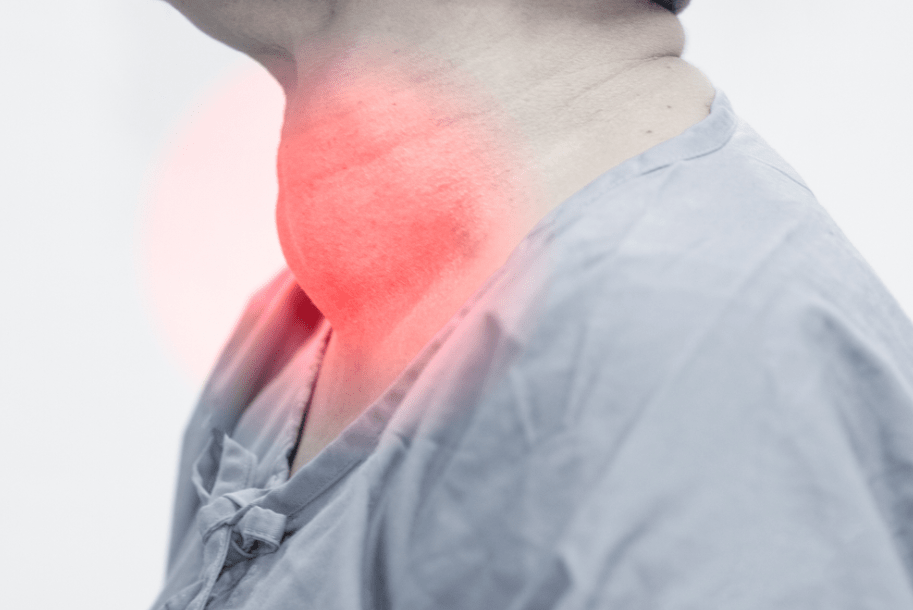Thyroid nodules are cystic structures filled with fluid that form due to the irregular functioning of the thyroid and abnormal proliferation of cells constituting the thyroid gland. Other causes of thyroid nodules may include insufficient dietary iodine and genetic factors.
Common symptoms of thyroid nodules include swelling in the throat, difficulty swallowing, and thickening of the voice. Effects of thyroid nodules can manifest as sudden weight loss, loss of appetite, and accompanying insomnia. If the nodule is very hard, shows capsular spread, and causes unilateral lymph node enlargement, there may be a risk of thyroid nodule cancer.
Istanbul is quite well-equipped for thyroid nodule surgery. After an examination revealing signs considered risky for potential cancer, the doctor may decide on thyroid nodule surgery. The risks of thyroid nodule surgery include hoarseness and calcium deficiency. However, these risks decrease depending on the surgeon’s level of expertise. The price of thyroid nodule surgery can vary depending on the extent of the operation and the patient’s condition.
Diagnosis and appropriate treatment of thyroid nodules is extremely important for both patients and their relatives. Information about the correct treatment method and how the disease will progress is valuable for patient relatives. Therefore, in this article, we will discuss in detail the symptoms, stages, and risks of thyroid nodules; thyroid nodule treatment options; types of thyroid nodule surgery, associated risks, and the postoperative process.
| Types of Surgery | – Lobectomy: If the nodule is located in one lobe of the thyroid, only that lobe is removed. This is preferred for benign nodules. – Total Thyroidectomy: Both lobes of the thyroid gland are removed. It is performed if there is suspicion of cancer or if the nodule affects both lobes. – Subtotal Thyroidectomy: Most of the thyroid is removed, leaving a small piece of tissue. |
| Surgical Requirements | – If the nodule is large and causing difficulty in breathing or swallowing. – If the nodule carries a risk of cancer or if biopsy results are suspicious. – If the nodule is producing hormones and causing hyperthyroidism. – If it is causing cosmetic discomfort or growing rapidly. |
| Preoperative Preparation | – Blood tests, measurements of thyroid hormone levels, and ultrasound are performed. – If necessary, the nodule is evaluated with fine-needle aspiration biopsy. – CT or MRI scans may be done to see the size and spread of the nodule. – Thyroid hormones are stabilized before surgery. |
| Type of Anesthesia | It is performed under general anesthesia; the patient is fully sedated during the procedure. |
| Duration of Surgery | Varies depending on the type of surgery, but usually lasts 1-3 hours. A lobectomy is completed in a shorter time, while a total thyroidectomy may take longer. |
| Recovery Period | – Hospital stay can be 1-2 days post-surgery. – Recovery typically takes 1-2 weeks. Mild throat pain, difficulty swallowing, and tenderness may occur. – Most patients can return to daily activities within a week. Slight swelling and hardness may develop at the surgical site; these symptoms generally decrease over time. |
| Postoperative Care | – Keeping the surgical site clean is important to prevent infection. – Pain relievers and infection-preventing medications may be given if necessary. – It is recommended to avoid heavy lifting and strenuous physical activities during the recovery period. – To prevent scarring, a cream or dressing may be used according to the doctor’s recommendation. |
| Complications | – Hoarseness: The nerves leading to the vocal cords may be damaged during surgery, causing temporary or permanent hoarseness. – Low Calcium: If the parathyroid glands are damaged, calcium levels may drop, requiring calcium supplementation. – Wound Infection: Proper care reduces this risk. |
| Follow-Up and Check-Ups | – Thyroid hormone levels are monitored post-surgery. If a total thyroidectomy was performed, lifelong thyroid hormone (levothyroxine) replacement may be needed. – If parathyroid gland function is insufficient, calcium and vitamin D supplements are administered. – Regular ultrasounds and blood tests are conducted for follow-up. |
| Psychological Support | Due to hormonal changes after surgery, mood swings may occur. Psychological support or counseling is recommended in such cases. |
How Is a Thyroid Nodule Diagnosed?
- Thyroid nodules are easily detected by thyroid ultrasonography.
- After this step, thyroid function tests are used to determine whether the nodule causes hyperthyroidism (commonly known as toxic goiter).
- If necessary, a thyroid scan can be performed to investigate the function of the nodule.
- Diagnosis is then confirmed by performing a fine-needle aspiration biopsy under ultrasound guidance.
What Is Thyroid Nodule Cancer?
Thyroid cancer is a type of cancer that can be treated and has a high success rate. Thyroid cancer, which develops due to uncontrolled proliferation of cells in the thyroid gland, appears as a mass in the neck or as a thyroid nodule.
Thyroid cancer is commonly seen in regions with low iodine levels. Additionally, exposure of the head and neck region to radiation, smoking, and genetic predisposition increase the risk of thyroid cancer.
What Is the Risk of Cancer in Thyroid Nodules?
The most important point for a patient with thyroid nodules is to determine whether there is cancer in the nodules and whether thyroid surgery is necessary, because there is about a 5% likelihood of cancer in a thyroid nodule.
What Are the Symptoms of Thyroid Nodules?
If thyroid nodules are large, they can be visible externally at the front of the patient’s neck. They move up and down during swallowing, making them noticeable. However, if the nodule is small, it cannot be seen with the naked eye and can only be diagnosed by a doctor’s examination or by ultrasound.
Small thyroid nodules do not usually cause any symptoms. However, when nodules grow, the following symptoms may occur:
- A sense of fullness or swelling in the neck and detection of a mass
- Hoarseness and a crackling change in the voice
- Difficulty swallowing and breathing
- Pain and discomfort in the neck area
Why Are Thyroid Nodules Important?
The most important point for a patient with thyroid nodules is to determine whether there is cancer in the nodules and whether thyroid surgery is necessary, because there is about a 5% likelihood of cancer in a thyroid nodule.
How Are Thyroid Nodules (Nodular Goiter) Treated?
In nodular goiter, if the thyroid is overactive (hyperthyroidism) and nodules are present in both lobes of the thyroid, the entire thyroid gland (total thyroidectomy) needs to be removed.
If nodules are only in one lobe of the thyroid, the thyroid lobe containing the nodules (lobectomy) is removed. If thyroid hormone levels are normal but there is cancer or suspicion of cancer in the nodules, surgery is required.
If surgery is decided in widespread nodular goiter, total thyroidectomy is recommended.
Additionally;
- If the patient with nodular goiter has received radiotherapy to the neck area for different reasons in the past,
- If the nodule diameter exceeds 4 cm,
- If rapid growth is detected in the nodules, surgery is again necessary.
- If surgery is decided in widespread nodular goiter, total thyroidectomy is recommended.
- If the thyroid nodule or nodules are unilateral, unilateral thyroidectomy (lobectomy) may be performed if the clinical situation is appropriate. If there are no conditions requiring surgery, the patient is monitored.
What Should Patients Under Observation Do in Nodular Goiter?
For patients under observation, a thyroid ultrasound should be performed every 6 months to investigate whether there is any growth or change in the appearance of the nodules. Nodules with no detected changes are then followed up annually.
What Is Thyroid Nodule Surgery?
A nodule is an abnormal growth within the thyroid gland. When nodules occur, the thyroid gland often grows proportionally alongside them. To determine whether the nodule is cancerous, a needle biopsy must be performed, and treatment is then applied based on the result. If the biopsy shows that the nodule is not cancerous, surgery is not required; however, follow-up of the process is very important. Postoperative pain is possible. Surgery is typically performed within about three hours. After surgery, the patient’s diet plays an important role in ensuring a good recovery.
How Is Thyroid Nodule Surgery Performed?
Thyroid cancer can be treated in different ways depending on its type and stage. Cancerous cells detected by biopsy must be surgically removed. Otherwise, there is a very high likelihood of the nodules recurring. This surgery can be performed by endocrine surgeons or general surgeons. When thyroid cancer is diagnosed during biopsy, either the entire thyroid gland or the cancerous parts are removed with thyroid cancer surgery. The procedure is carried out via lobectomy or thyroidectomy methods, which involve a 6 to 7 cm incision in the neck area.
What Are the Risks of Thyroid Nodule Surgery?
Postoperative pain is possible. If the vocal cords inside the larynx are damaged during surgery, you may experience voice loss. It should also not be forgotten that very good postoperative care of the patient is necessary.
How Long Does Thyroid Nodule Surgery Take?
Surgery is generally completed in about three hours. In most thyroid nodule surgeries, general anesthesia is used, and the patient is put to sleep before starting the procedure. The duration of putting the patient to sleep, performing the surgery, and waking the patient up after anesthesia is around one to two hours. This time frame can vary depending on the patient’s age and condition. Although an extended process is generally not required for the surgery, other procedures may be performed depending on the method used, which can vary based on the tumor’s condition and the patient.
Recovery Time After Thyroid Nodule Surgery
Postoperative recovery can vary depending on the patient’s age, general health, and the type of procedure. The pace of recovery is directly proportional to the size of the tumor and the removal method used. Proper care of the surgical wound and attention to it after the surgery are extremely important. In general, the patient can return to daily life within about two weeks. Surgery, treatment, and recovery times may differ from person to person. The more carefully the patient follows instructions, the quicker recovery can be achieved.
How Should You Eat After Thyroid Nodule Surgery?
Patients must pay significant attention to their diet after surgery. This includes being mindful of the foods and beverages consumed. Doing gentle exercise without straining yourself can ease this period. Eating the foods prescribed by your doctor is very important for your health after thyroid nodule surgery. Proper nutrition forms the basis of recovery. Paying attention to your diet during this process is of great importance.
What Should Thyroid Nodule Surgery Patients Pay Attention to Postoperatively?
There are many points to consider after surgery. To avoid recurrence of the disease, it is necessary to pay attention to nutrition and daily activities. Try to stay away from psychological depression and anxiety. Be sure to follow the daily activities recommended by your doctor. Remember that the postoperative period is just as important as the surgery itself.
Which Department and Doctor Should Be Consulted for Thyroid Nodule Surgery?
A thyroid nodule is a common condition that may need to be removed at some point. If you have a similar problem, consulting a doctor would be a good idea. Such an approach could benefit you in terms of improving your quality of life and avoiding health problems. So, which department and doctor should you visit for thyroid nodule surgery? Certainly, the Internal Medicine (Endocrinology) department can help, but make sure to contact the hospital for confirmation. If you go to this department as soon as possible and communicate with them, they will provide you with the information you need. Thus, you can regain your health in a short time.
How Much Does Thyroid Nodule Treatment Cost?
Thyroid nodule treatment costs vary depending on the patient’s condition and where the surgery is performed. The disease may not progress in the same way in every person. Therefore, your doctor is always the best source of detailed information on this topic. If you want more precise information about the process, you can consult your doctor.
Frequently Asked Questions About Thyroid Nodules
When is a thyroid nodule considered dangerous?
Thyroid nodules develop in the tissue of the thyroid gland. The vast majority are benign and harmless, usually noticed at around 2 cm. Their normal size ranges from about 1–2 mm to 2 cm. Nodules that exceed 3 or 4 centimeters begin to cause symptoms and become dangerous.
How can a thyroid nodule be eliminated?
If thyroid nodules are benign and under 1 cm, simply monitoring them is sufficient. However, if their size continues to increase, they should be surgically removed. Another treatment method involves heat ablation, i.e., thermal ablation, which can be applied to cystic nodules. If the nodule is solid, alternative methods such as laser ablation, RF ablation, or microwave ablation may be used. However, in such cases, it is essential to be sure that the thyroid nodule does not contain cancer cells. If there is even the slightest suspicion, surgery is indicated.
What are the symptoms of thyroid nodules?
The patient feels as though there is a mass in the throat and has difficulty swallowing. There is a palpable swelling in the neck, and a chronic cough may persist. Tremors in the hands, weight loss, and irritability are also among the complaints observed.
Which thyroid nodule is dangerous?
If the nodule exceeds 3 cm in diameter, is hard in texture, has an irregular border, has a poor relationship with adjacent tissues, and there is excessive blood flow within the nodule, it is considered dangerous.
Can a thyroid nodule turn into cancer?
Rapid growth of the nodule, findings on a neck ultrasound that suggest cancer, a nodule that is cystic or solid, a family history of thyroid cancer, or childhood exposure to radiation can lead thyroid nodules to become cancerous.
Do thyroid nodules cause coughing?
As thyroid nodules grow, they cause pressure in the throat and neck area. This can result in localized pain. Also, when nodules exert pressure on the windpipe, symptoms such as shortness of breath and coughing may occur.
Which thyroid nodules can be treated without surgery?
If a nodule is benign, not growing, and is not causing symptoms, treatment is generally not given; it is monitored instead. If the nodule is growing and not solid, it can be treated without surgery using an alcohol injection technique. This method is also effective in patients with multinodular goiter and toxic goiter. However, it is important to be certain that the thyroid nodule does not contain cancer cells. If there is any suspicion, surgery is performed.
Do thyroid nodules cause pain?
Thyroid nodules generally do not cause symptoms, but as nodules grow, pain may occur in the affected areas. As the nodule exerts pressure, the patient may feel pain in the neck.
How should people with thyroid nodules eat?
Because Omega-3 has a regulatory effect on the thyroid, fish should be consumed at least twice a week. Additionally, monounsaturated fatty acids, zinc, iodine, and green leafy vegetables should be included in the diet of patients with thyroid nodules.
Do thyroid nodules resolve on their own?
Thyroid nodules do not resolve on their own, but their growth may stop. In this situation, it is important that the size of the nodule does not exceed 2 cm and does not cause any complaints.
References:









İstanbul'daki Muayenehane Konumu